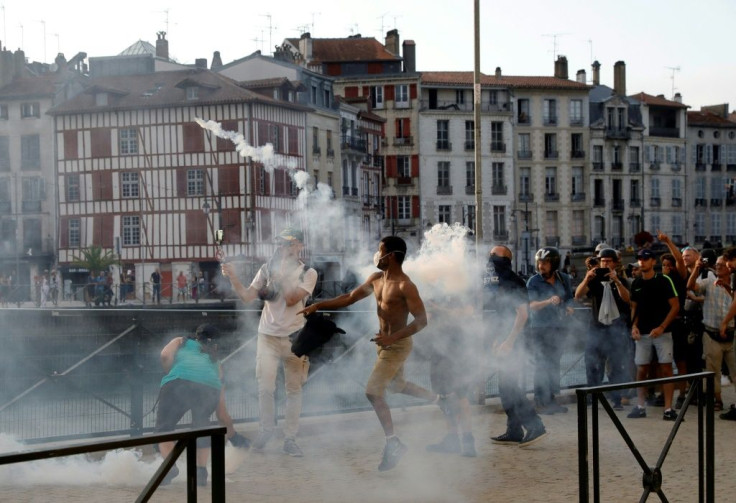EU leaders round on Trump over trade at G7

European leaders rounded on US President Donald Trump over his trade threats Saturday at a G7 summit in France marred by trans-Atlantic tension and worries about the global economy.
The heads of the visiting G7 countries -- Britain, Canada, Germany, Italy, Japan and the United States -- were all smiles at a swanky welcome dinner hosted by French President Emmanuel Macron on a clifftop overlooking the surfing paradise of Biarritz.
Fine French wines and champagne were served along with a dinner including locally fished bluefin tuna.
But once the evening ended, the leaders faced two intensely tricky days of a summit overshadowed by Trump's trade war talk even before it started.
After ramping up his high-risk game of tit-for-tat tariffs with China on Friday, Trump left for the meeting with his Western partners threatening to impose punishing taxes on French wine.
European Union Council President Donald Tusk warned Saturday that the bloc would "respond in kind," although he added: the "last thing we need is confrontation with our best ally the United States."
Macron and British Prime Minister Boris Johnson also sounded the alarm over Trump's escalating struggle with China.
"I am very concerned. The UK is at risk of being implicated in this. This is not the way to proceed," Johnson told reporters.
"I want to see a dialling down of tensions."
G7 summits were once a meeting of like-minded allies -- the richest democracies in the world. But they've become a diplomatic battlefield under Trump.
In an attempt to break the ice, Macron deployed the charms of French cuisine earlier Saturday, treating Trump to an unscheduled lunch as soon as he arrived on Air Force One.
Speaking to reporters in fluent English, Macron called Trump "a very special guest" and aides later said that the two men had found some common ground, notably on the Iran nuclear crisis.
'So far so good'
Trump, sitting across the small table on a terrace of the ornate Hotel du Palais, appeared pleased.
"The weather is perfect. Everybody's getting along. I think we will accomplish a lot this weekend," Trump said, praising his "special relationship" with Macron.
G7 chiefs are also hoping to soothe tensions over Iran's nuclear crisis and persuade Trump to ease his policy of "maximum pressure", for example by lifting sanctions on Iranian oil sales to China and India.
"Donald Trump confirmed that he does not see a conflict," a French official told reporters on condition of anonymity.
"We have found major points of convergence," the aide added, including on the issue of protecting the Amazon rainforest in Brazil.
Macron is pushing for action against fires in the Amazon rainforest, despite Brazilian right-wing President Jair Bolsonaro's angry response to what he sees as outside interference.
'People are mobilised'
Even largely peaceful protests were allowed only far from the summit site in Biarritz.
One anti-capitalism demonstration in the town of Bayonne turned ugly when the crowd of several hundred tried to get through police barricades and was repelled with water cannon and tear gas, AFP reporters said.
Earlier, organisers in the French border town of Hendaye said 15,000 people rallied for a march over the Bidassoa River toward the Spanish town of Irun.
"It's important to show that people are mobilised and do not accept the world they're offering us," said Elise Dilet, 47, of a local anti-globalisation group, Bizi.
Police said 17 people were arrested on Friday night, but there has been no sign so far of violent anti-government "yellow vest" protests or anarchist violence, as feared.
Escalating threats
The turmoil that G7 governments fear most is in the world economy.
Wall Street stocks slumped heavily Friday after Trump escalated his trade war with China.
"We don't need China and, frankly, would be far... better off without them," Trump tweeted on Friday.
His outburst came after China imposed tariffs on US imports worth $75 billion in response to an earlier round of American measures.
Trump hit back immediately, with a sharp increase in his own tariffs on all Chinese imports.
A Chinese commerce ministry spokesman on Saturday denounced Washington's "unilateral and bullying trade protectionism", adding that "the US will surely eat its own bitter fruit."
In a televised address ahead of the summit, Macron said his goal was "to convince all our partners that trade tensions are bad for everyone".
The G7 meeting marks the full international debut of Johnson, who will hold talks with Trump for the first time as Britain's leader on Sunday.
They are expected to discuss the UK's impending exit from the European Union, which the US president has enthusiastically backed.
Johnson arrived saying that he was committed to yanking Britain from the EU with no deal on future relations if his conditions are not met.
But though Johnson needs Trump's support for a free-trade deal, he is at odds with him on a range of issues including Iran nuclear tensions, climate change and global trade.
burs-sms-adp/pvh
© Copyright AFP 2024. All rights reserved.





















